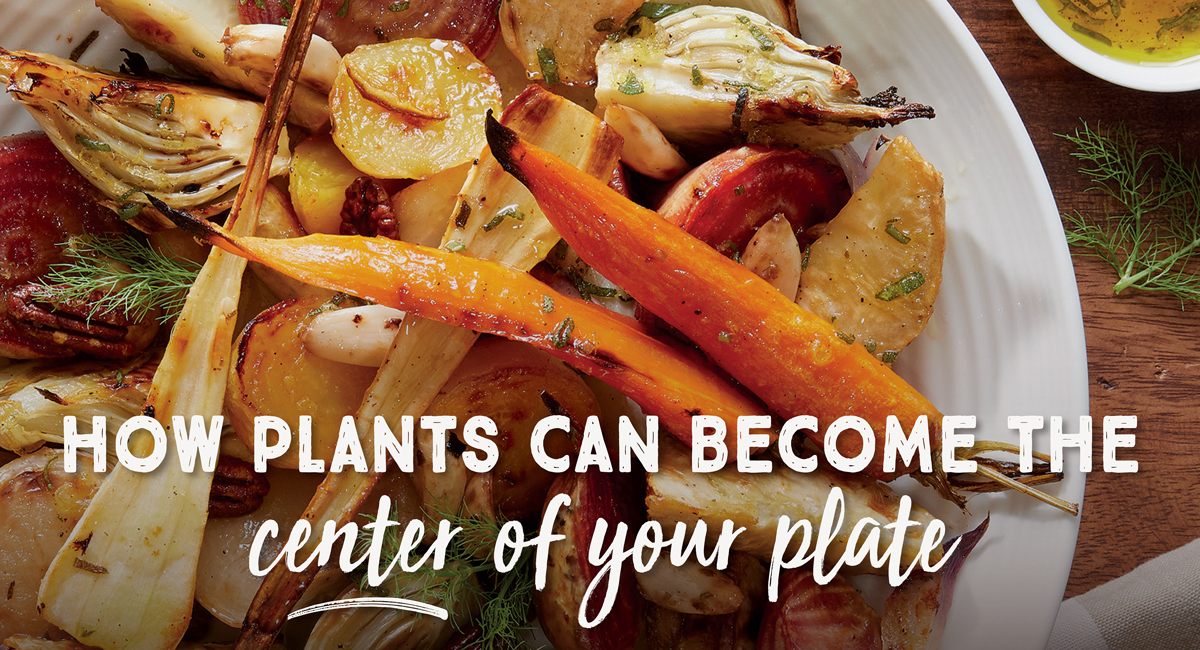
If you’ve considered cutting back on the amount of meat you eat, you’re not alone. For years, medical professionals have been urging us to consume more fruits and vegetables, and it’s clear that more and more people are giving it a go.
Whether you’ve already adopted or are contemplating a lifestyle that’s vegetarian, vegan or plant-based, we make it easy for you to enjoy foods that align with your choices. We offer a wide array of options in every department, from Produce and Bulk to our Bakery and Kitchen. You can even narrow your search for vegetarian and vegan choices when browsing our online specials.
What’s the difference between plant-forward, vegetarian and vegan?
- Vegetarian: While excluding meat and poultry, some vegetarians do consume dairy, eggs or both as part of their diet.
- Vegan: This lifestyle choice excludes or minimizes all forms of animal exploitation, including that of bees. Vegans omit meat, seafood, dairy, eggs and honey. Many vegans also choose not to wear or use products made with animal products.
- Plant-forward: While emphasizing food from plants, plant-forward diets may not be limited to them. Meat may be included in a meal, though as a side dish and not the main focus.
- Other alternatives: Pescatarian diets exclude meat, poultry, dairy and eggs, but allow seafood. Flexitarian (also called semi-vegetarian) diets mostly include plant foods but allows meat or fish on occasion, in small quantities.
What are the benefits of a plant-forward lifestyle?
The main reason most people eliminate or reduce the amount of meat they consume is related to health benefits, which include lowering the risk of heart disease, diabetes and cancer. In addition to health reasons, some people choose these lifestyles because of environmental or ethical reasons.
How common are plant-based diets?
According to a poll commissioned by the nonprofit Vegetarian Resource Group, 6% of adults are full-time vegetarians, with half classifying themselves as vegans. In addition, more than half of Americans always or sometimes choose to eat vegetarian meals when dining out.
How to get the nutrients you need on a plant-based diet
Whatever your choice, it’s important to ensure that your diet includes enough nutrients. Foods like tofu, quinoa, mushrooms, lentils, chickpeas, beans and legumes can help provide needed protein. There are also many good vegetable protein sources, such as artichokes, asparagus, broccoli, spinach and potatoes, to name a few.
If you reduce or eliminate dairy, you may want to add calcium-fortified products like soy milk, tofu and some orange juices. Dark-green leafy vegetables, like collard greens, spinach and kale, are good sources of calcium.
The key is to add high-quality, nutrient-dense, plant-based foods and avoid highly processed foods.
Ready to get started?
Look for vegan, vegetarian and plant-forward options when shopping at Market of Choice. Our Produce Department is a great place to start – we offer a wide variety of fresh, colorful, locally grown, organic and conventional fruits and veggies. In our bulk section, you’ll discover a range of nuts, dried fruits, beans, grains, pastas and seasonings. Our chilled section includes both dairy and non-dairy alternatives. In the Kitchen, you’ll find a fantastic array of vegetarian, vegan and plant-forward choices, perfectly prepared by our Market Chefs for easy yet nutritious meals. You’ll even find vegan choices at our Bakery, from pies and cakes to breads and rolls. Shop the aisles and you’ll discover even more choices.
Feel free to ask any of our friendly teammates to help you identify products that suit your lifestyle – we’re here to help!
Sources and suggested links:
Explore More Topics
Recent Posts
- Going Gluten-Free in Oregon? Market of Choice Makes It Delicious.
If you’re newly gluten-free, welcome to the club—membership includes great snacks, excellent pancakes, and the occasional moment of staring at a menu like it’s written in ancient runes. Don’t worry. You’re not alone, and you definitely don’t have to give up delicious food. In fact, thanks to Oregon’s vibrant community of gluten-free makers (many of which you’ll find right here at Market of Choice), going gluten-free has never tasted better.
- Kickstart the Year with an Alcohol-Free January
Join the alcohol-free January movement with a wide range of zero-proof drink options at Market of Choice.



